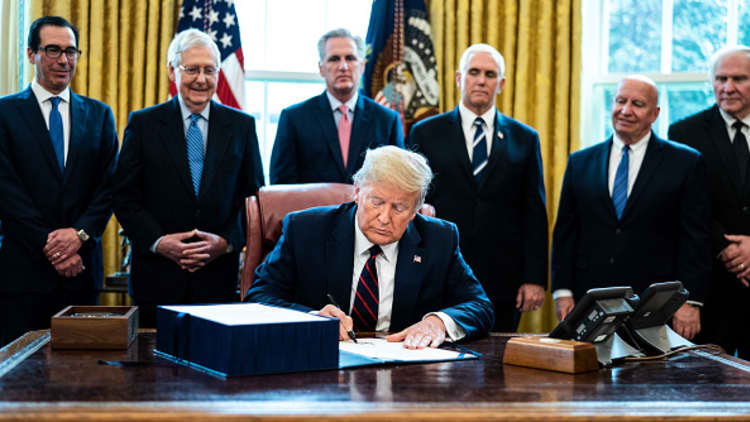Some of the world's largest investment firms combined to spend at least $3 million lobbying members of the Trump administration and lawmakers on a bill that was meant to give relief to those that have taken a financial hit due to the coronavirus.
Blackstone, the Carlyle Group and SoftBank took aim at the $2 trillion stimulus package that was signed by President Donald Trump in late March as the global pandemic was shaking the stock market and forcing millions of people out of work. These companies and their lobbyists engaged with Treasury officials and leaders in the House and Senate, records show.
People close to two of these companies say the lobbying goals ranged from pushing for their portfolio companies to participate in the federal loan program to monitoring the legislation as it developed. None appear to be trying to get small business loans to go directly into the private equity industry.
The discovery was made by CNBC after reviewing new first-quarter lobbying reports. Many leaders of these companies have ties to Trump himself, including Steve Schwarzman, CEO of private equity giant Blackstone. Schwarzman took part in a March 24 call with Trump and prominent investors such as Third Point's Dan Loeb, Intercontinental Exchange's Jeffrey Sprecher and Paul Tudor Jones.
Though not all the forms say what the firms were specifically hoping to see in the bill, the move came as the American Investment Council, an organization whose members include the three firms, tried to influence the legislation on its own. The organization pushed for the Treasury's $500 billion economic stabilization fund to provide enough liquidity to larger businesses. The group also called on the $350 billion small business paycheck program to not discriminate on deciding who qualified for a relief loan, particularly if they're backed by private equity firms. The American Investment Council ended up spending $640,000 on lobbying in the first quarter alone, records show.
The Small Business Administration last week announced that private equity firms and hedge funds were not getting any of the loans intended for small businesses. Trump recently signed a separate $484 billion stimulus bill with more than $300 billion of that total going to the small business loan system, which is officially known as the Paycheck Protection Program.
SoftBank, a Japan-based conglomerate run by Masayoshi Son, with large tech investments and offices in the United States, said its lobbying campaign focused on the government allowing financial technology companies to be lenders for the PPP. The company, which has a market cap of close to $90 billion, spent $1.2 million on lobbying that in part went toward the bill. A representative told CNBC that two of its portfolio companies, Kabbage and SoFi, are now participating in the wake of their efforts.
During its lobbying of the CARES Act, SoftBank spoke with those in Trump's Executive Office of the President, which is overseen by the White House chief of staff, and those in Vice President Mike Pence's office, the form reads.
Matt Anderson, a spokesman for Blackstone, insisted that the firm was not lobbying any of the bill's loan programs and was instead using lobbyists as a way to mainly monitor and analyze the legislation.
"Blackstone did not engage in any lobbying for the CARES Act loan programs, and was generally monitoring and analyzing the legislation," he said, and did not return follow-up questions on what beyond the monitoring of the legislation the firm was hoping to see from those it hired.
Blackstone turned to Jeff Miller, a lobbyist who bundled more than $2 million in the first quarter of 2020 for Trump's campaign and the Republican National Committee. Their administrative services arm, Blackstone Administrative Services Partnership, spent $90,000 on Miller's firm's services, which mainly targeted the bill.
The lobbying form twice lists "issues as they relate to COVID-19 financial relief legislation," as what Miller and his team was focusing on for Blackstone. Throughout the first three months of 2020, Miller's office, while representing a division of Blackstone, connected with officials, from the Treasury, Department of Labor, Environmental Protection Agency and those in the Small Business Administration, the firm's form said.
The private equity behemoth, which has nearly $540 billion in assets under management, also looked to Harbinger Strategies, which employs lobbyists with close ties to House and Senate Republicans, along with one former member of the Trump administration. Blackstone paid them $470,000 in the first quarter and the form twice mentions the CARES Act as an issue the lobbyists were looking into at the time.
Carlyle Group, a firm co-founded by longtime executive David Rubenstein with more than $200 billion in assets under management going into 2020, spent $1.2 million on lobbying in the first quarter and most of its efforts, the form shows, went toward the bill. The document notes that "airline and airport relief provisions in the CARES Act" was something it targeted.
Carlyle, according to its website, has had at least two investments in the aviation businesses, including Landmark Aviation, and PrimeFlight Aviation. The initial bill had $25 billion in airline payroll grants as the industry as a whole has been hammered by the coronavirus pandemic.
However, CNBC has reported that the Treasury has recently requested that the largest U.S. airlines pay back 30% of the payroll grants.
A spokeswoman for Carlyle declined to comment.



